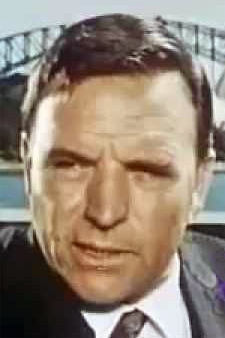Related Research Articles

Edward Sidney Devereaux, better known professionally as Ed Devereaux, was an Australian actor, director, and scriptwriter who lived in the United Kingdom for many years. He was best known for playing the part of Matt Hammond the head ranger in the Australian television series Skippy the Bush Kangaroo. He was also involved in the series behind the scenes, Devereaux writing the script and directing the episode The Veteran (1969), for which he received much critical acclaim. Devereaux based the story of the episode "Double Trouble" on an idea conceived by his children, wrote the screenplay of "Summer Storm" and the script for "The Mine". He also played the part of Joe in the Australian 1966 film They’re a Weird Mob. The film was a local success.

Keith Joseph Michell was an Australian actor who worked primarily in the United Kingdom, and was best known for his television and film portrayals of King Henry VIII. He appeared extensively in Shakespeare and other classics and musicals in Britain, and was also in several Broadway productions. He was an artistic director of the Chichester Festival Theatre in the 1970s and later had a recurring role on Murder, She Wrote as the charming thief Dennis Stanton. He was also known for illustrating a collection of Jeremy Lloyd's poems Captain Beaky, and singing the title song from the associated album.
Peter Joseph Kenna was an Australian playwright, radio actor and screenwriter. He has been called "a quasi-legendary figure in Australian theatre, never quite fashionable, but never quite forgotten either."
Peter Alan Yeldham was an Australian screenwriter for motion pictures and television, playwright and novelist whose career spanned five decades.
Ken Hannam was an Australian film and television director who also worked in British television drama.
Oscar Ralph Whitbread was an English-Australian producer who worked extensively in television.
"A Season in Hell" is a 1964 Australian TV movie broadcast on the ABC which originally aired as an episode of Wednesday Theatre. It was directed by Henri Safran from a script by Patricia Hooker and was shot at the ABC's Gore Hill Studios in Sydney. "A Season in Hell" aired on 1 April 1964 in Sydney, on 22 April 1964 in Brisbane, and on 29 April 1964 in Melbourne.
The Concord of Sweet Sounds is a 1963 Australian television play starring Stuart Wagstaff, directed by Henri Safran and written by Patricia Hooker. Henry Gilbert played a musical genius. Australian TV drama was relatively rare at the time.
"Point of Departure" is a 1966 Australian television film. It screened as part of Wednesday Theatre. Australian TV drama was relatively rare at the time. "Point of Departure" aired on 22 June 1966 in Sydney, on 29 June 1966 in Melbourne, and on 27 July 1966 in Brisbane.
"The Tape Recorder" is the second television play episode of the first season of the Australian anthology television series Australian Playhouse. "The Tape Recorder" was written by Pat Flower and directed by Henri Safran and originally aired on ABC on 25 April 1966.
Storry Walton is an Australian academic, writer, producer and director. He produced and directed many television plays and serials, including My Brother Jack. He has directed ABC documentaries on art and on rural matters. While based in London, made programs for the BBC-TV social documentary series, Man Alive.
David Cahill was an Australian actor, writer-producer and director, notable for his work directing for television from its introduction in the 1950s through to 1970s. It has been claimed he was one of the best directors working in early Australian TV. His pioneering credits at ATN7 included Australia's first religious TV series, featuring a teenaged Annette Andre, and first long-running dramatic serial starring Muriel Steinbeck.
Christopher Muir was an Australian director and producer, notable for his work in TV in the 1950s and 1960s. In the 1980s he was head of ABC Television drama.
William Sterling was an Australian producer and director. He was born in Sydney.
Patrick Barton is an Australian TV director best known for his productions in the 1960s.
"Done Away With It" is the 16th television play episode of the first season of the Australian anthology television series Australian Playhouse. "Done Away With It" was written by Pat Flower and directed by Henri Safran and originally aired on ABC on 1 August 1966.
Noel Robinson is an Australian writer of many television and radio plays in the 1960s. Split Level (1964) was her first original screenplay. Filmink called her "a writer who should be better known." She moved to London where she worked for over a decade.
Sydney Leicester Conabere was an Australian actor. He was notable for his work in theatre, film and television drama in a career spanning more than fifty years. In 1962 Conabere won the Logie award for Best Actor, for his performance in the television play The One Day of the Year. He worked prolifically as a stage actor from 1938 to 1989, particularly with the Melbourne Theatre Company and Melbourne Little Theatre, sharing the stage with Irene Mitchell in, for example, Lilian Hellman's The Little Foxes.
Raymond Westwell was a British actor and director who worked for many years in Australia. He made his Australian TV debut in The Angry General. He worked as a director of theatre, notably Camelot.
"Write Me a Murder" is a television play that aired in 1965 as part of ABC's Wednesday Theatre. It was directed by Henri Safran. Murder mysteries were a popular subject matter on Australian television at the time.
References
- ↑ Andrew Pike and Ross Cooper, Australian Film 1900–1977: A Guide to Feature Film Production, Melbourne: Oxford University Press, 1998, 306.
- ↑ Margaret Smith, "Henri Safran talks about Norman Loves Rose", Cinema Papers, October 1982 p409 -412
- ↑ Vagg, Stephen (14 June 2021). "Forgotten Australian TV Plays: A Season in Hell". Filmink.
- ↑ Vagg, Stephen (4 October 2021). "Forgotten Australian TV Plays: Point of Departure and Man of Destiny". Filmink. Retrieved 13 August 2024.